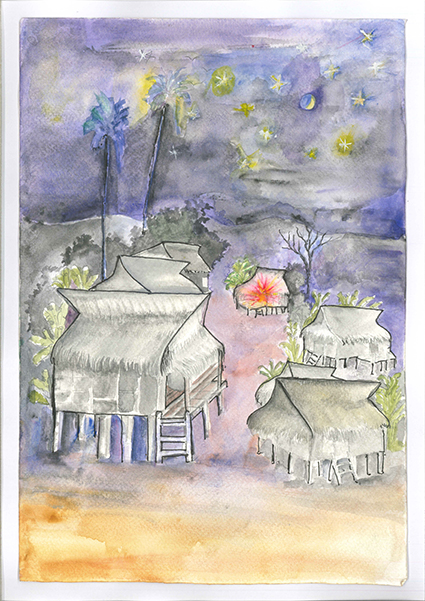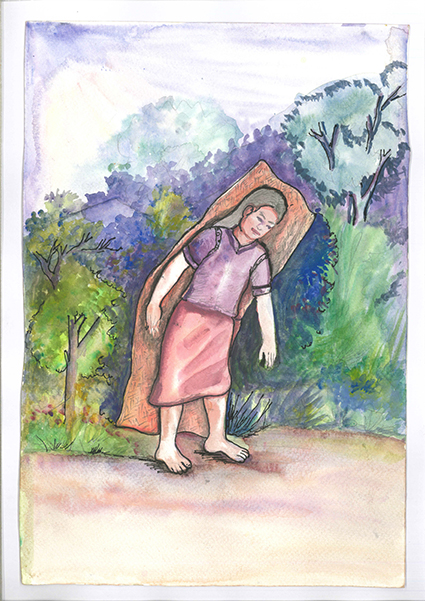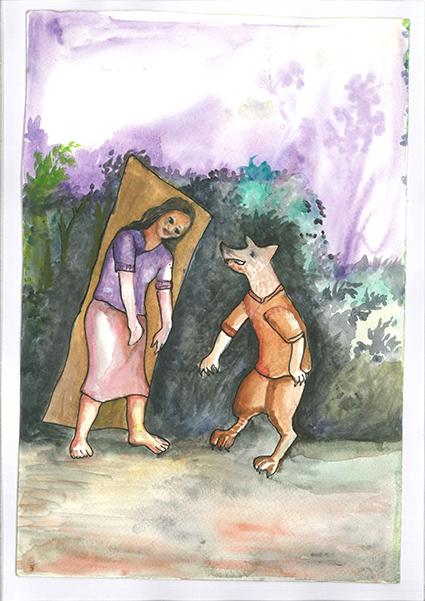
Stories from Bunong Communities in Northeastern Cambodia
A Civet Cat
This story was told by Tanaly at Khone Keo Village on 12 October 2014. It explains the origin of sing mong, or sing ngaen mong, or a civet cat. Kmhmu people in some communities also title the story “Grandmo Tid Tieng.” Tid Tieng means someone stuck with a bed.
Long time ago, there lived a boy and a girl. They loved each other very much and promised to get married. Unfortunately, however, the boy, Pho Ja Rang, had to serve as a volunteer in a three-year military mission. He told the girl that he would marry her after his volunteer mission.
The girl waited for the boy to return to her for a long time. However, she became heavily sick and died in the end. Her relatives and villagers tried to bury her in a forest. Strangely, though, they could not move her body. It was stuck to the mattress and bed. The villagers became scared of this. So, they decided to move the village instead and left her body there.
Pho Ja Rang completed his mission in three years and came back to his village. He arrived at the village in the evening. He saw the light at his girlfriend’s house. So, he hurried to the house. He arrived and opened the door. It was very dark inside. He asked his girlfriend to turn on the light. She then told him, “Do so for yourself. If I do, you will fear me.”
However, after all, she turned on the light, as she did not want to upset Pho Ja Rang. They then talked with each other as they used to before. Suddenly, though, he noticed that she was not normal. He realized that she had already died and become a ghost. So, he decided to run away. He told her to wait for a while as he was going to pee. She did not let him go, however. Pho Ja Rang kept asking many times. She finally allowed him to go.
When Pho Ja Rang went out of the house, he caught a louse and left it at a nearby house. He said to the louse, “If someone calls my name, please say ‘I am here’.” He also picked up a kettle full with water and turned it upside down. The water came out from the kettle, which made the noise as if he was peeing.
Pho Ja Rang ran and escaped into a forest. Soon after, the ghost started calling him, “Pho Ja Rang!” “I am here,” replied the louse. Every time she called Pho Ja Rang, she heard the same answer. So, she went out to find him. She found the louse and the kettle instead. She went searching him with the bed stuck on the back, saying, “Pho Ja Rang is mine! Pho Ja Rang is mine!”
Pho Ja Rang kept running in the forest but became very tired. He stopped at som fard, or a sour tree, and found ngen mong, or civet cat, there. He asked the cat help him. The cat told him to take off all his clothes and hide in a hollow of the tree. The civet cat then put on Pho Ja Rang’s clothes.
The ghost came. When she saw Pho Ja Rang, she was so happy. She touched him and danced with him. She said, “These clothes belong to Pho Ja Rang. But you have paws and feet of a civet cat.” She kept saying, “My boyfriend! My boyfriend!” The ghost and the civet cat danced for a little while. However, in the end, the civet cat bit the ghost’s neck. The ghost died.
Pho Ja Rang and all his family and relatives thanked the civet cat for his great help. He considered a civet cat as a fortune of his family. He promised not to kill or eat civet cats and respected them. Pho Ja Rang and his family believed that they would lose their teeth and their skin would be burned, if they eat the meat civet cats. They also decided not to use som fard, or sour trees, to make a pillar for a house or a rice storage, because they were afraid that it would bring about a misfortune, such as sickness, death, and wasting rice.



